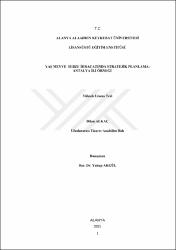Yaş meyve sebze ihracatında stratejik planlama: Antalya ili örneği
Abstract
Tarım ürünleri içerisinde dünyada ticareti yapılan ürün gruplarından yaş meyve sebzenin insan sağlığı ve beslenmesindeki önemi oldukça fazladır. Türkiye yaklaşık 54.8 milyon tonluk yaş meyve sebze üretimi ile dünyanın önemli üreticilerinden biridir. Ancak ihracat/üretim oranının hedeflenen düzeye ulaşamamasından dolayı yaş meyve sebze ihracatında süreklilik ve kalitenin sağlanması, ülke ihracatı açısından önem arz eden bir konu halini almıştır. Bu sebeple çalışmada yaş meyve sebze ihracatında yaşanan problemlerin tespiti ve bu problemlere yönelik stratejik hedeflerin belirlenmesi amaçlanmıştır. Araştırmada nicel veri toplama yöntemlerinden olan anket yöntemi kullanılmıştır. Alanyazın ve uzman görüşleri alınarak oluşturulan, normallik ve güvenilirlik testlerinin yapıldığı ölçeklerin yer aldığı anket, Antalya'da düzenli ve aktif şekilde faaliyet gösteren 108 yaş meyve sebze ihracatçısına uygulanmıştır. Araştırma kapsamında yüzde, frekans ve anova analizi yöntemlerinden yararlanılmış ve verilerin işlenip analiz edilmesinde SPSS 21.0 istatistik programı kullanılmıştır. Çalışma sonucunda; ilin yaş meyve sebze ihracatında güçlü yönünün her mevsim yaş meyve sebze üretim ve ihracatına olanak sağlaması, zayıf yönünün ise ihracata konu ürünlerde yaşanan kalıntı sorunu olduğu tespit edilmiştir. Antalya'nın yaş sebze meyve ihracatındaki en büyük fırsatı ise sebze ve meyvenin miktar ve çeşit bakımından zenginliği, ihracat taşımacılığına uygun soğuk zincir varlığı ve her türlü taşımacılığa imkan veren ulaşım ağı sayesinde sürekli yaş meyve sebze ihracatı yapacak potansiyelde olmasıyken, diğer ülkeler tarafından uygulanan kotaların ihracat açısından tehdit oluşturduğu sonucuna ulaşılmıştır. İhracata konu ürünlerde yaşanan zirai ilaç ve kalıntı sorunu, söz konusu ürünlerde depolama ve lojistiğe uygun ambalaj kullanılmaması, Türk yaş meyve sebzesini tanıtıcı faaliyetlerin yeterli olmaması, teşviklerin yetersiz, taşıma maliyetlerinin ise yüksek olması ihracatta yaşanan temel problemler olarak tespit edilmiştir.
Fresh fruits and vegetables which are among the product groups traded in the world are very important in human health and nutrition. Turkey is one of the world's leading producer with about 54.8 million tons of fresh fruit and vegetable production. However, since the export/production ratio could not reach the targeted level; ensuring continuity and quality in the export of fresh fruits and vegetables has become an important issue for the export of the country. Therefore, it is aimed to determine the problems experienced in the export of fresh fruits and vegetables in this study and to determine the strategic targets for the problems. Questionnaire method which is one of the quantitative data collection methods was used in this research. The questionnaire which includes the scales in which normality and reliability tests are made was created by taking the opinions of the literature and experts. It was applied to 108 fresh fruit and vegetable exporters operating regularly and actively in Antalya. Percentage, frequency and anova analysis methods were used within the scope of the research, and the SPSS 21.0 statistical program was used to process and analyze the data. As a result of the study, it has been determined that the strength of the province in the export of fresh fruits and vegetables is that it can produce fresh fruits and vegetables in all seasons and that it allows export, while the weakness is the residue problem in the products subject to export. The biggest opportunity of Antalya in the export of fresh fruits and vegetables is that it has the potential to continuously export fresh fruits and vegetables thanks to its richness in product variety, the presence of a cold chain suitable for export transportation and the transportation network that allows all kinds of transportation, while it has been concluded that the quotas applied by other countries pose a threat to exports. The problem of pesticides and residues in the products subject to export, the use of packaging non-suitable for storage and logistics in the products in question, the inadequacy of promotional activities for Turkish fresh fruit vegetables, insufficient incentives and high transportation costs have been identified as the main problems experienced in exports.
Collections
- Tez Koleksiyonu [242]


















